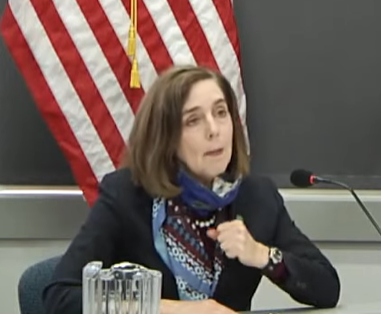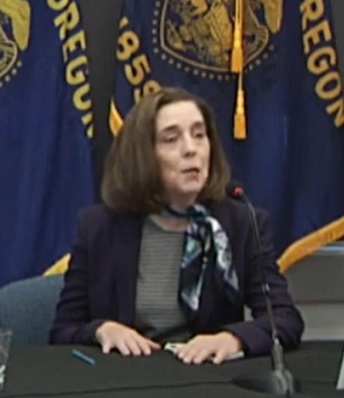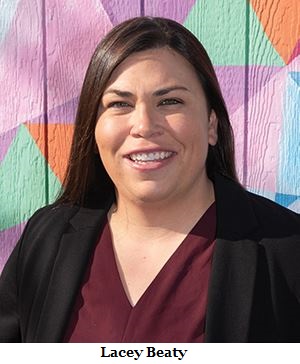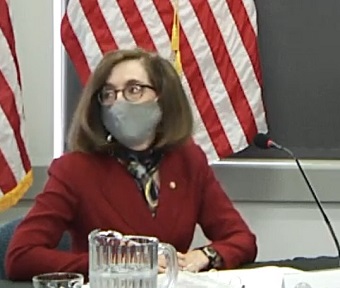
On this day, August 23, 2020, Portland police arrested 14 people overnight after officers were hit by rocks, bottles and paint balls, following violent clashes between rival groups of demonstrators that roiled the city's downtown area a day earlier.
 Post an Event
Post an Event
| Benton County Republicans’ Private Fundraising Event, “Bent-on Boots and Bling” with Trey Taylor |
| Friday, September 5, 2025 at 5:00 pm |
| Featuring Trey Taylor
Music Private Event
Friday, September 5, 2025 5:00-5:30 pm VIP Reception
5:30-8:00 pm Heavy Appetizers,
Auction, Concert
Red: $750 VIP Reception
Front Row Table Sponsor
White: $500 Table Sponsor
Blue: $50 per person
Limited Seating. Get Yours Now!!!
Support Local
Dress up: Bling, Cowboy, Patriotic Benton County Republican
FUNDRAISER
www.BentonGOP.org
Get your tickets today at:
https://www.bentongop.org/event-details/benton-county-republicans-fundraiser/form
About Trey:
Trey is the youngest African American Man in Country Music History. The Denver Post wrote
"It's impossible to miss his enthusiasm. With a fondness for cowboy boots, gaudy colors and dazzling jewelry, Trey Taylor could stand toe to toe with any of the Pop, Country or even Rap
contemporaries of his generation.“ |
| Trysting Tree Golf Club, 34028 NE Electric Rd., Corvallis |
“The recent increase of cases in our community has been substantial and alarmingâ€
In a
letter addressed to the Deschutes County Commissioners, Bend Mayor Sally Russell is asking that County leaders ask citizens to mask up.
Though the letter is signed only by herself, Russell uses the first person plural to introduce the letter. "We are writing to you today to urge you to fulfill your roles as public health leaders and join us in informing our community of the imperative need for everyone to wear masks indoors in public spaces or anywhere else the risk of transmitting Covid-19 is high. The recent increase of Covid-19 cases in our community has been substantial and alarming."
Russell cites the infectiousness of the Delta variant as one reason for wanting the mask mandate. "A unique variant of concern appeared in Deschutes County in late June. We agree with their conclusion that this indicates the presence of the Delta variant in our community — a powerful mutation of Covid-19 that has a higher viral load (meaning a greater amount of the virus is present in the nose and mouth) and, accordingly, a much faster infectious period."
She also makes note of hospital capacity in Bend, caused by staffing shortages. "We are acutely aware of St. Charles’ staffing shortages, and we recognize the critical need to support our local health care workers through this time. Beyond that, we also realize our collective responsibility in ensuring that our hospital system is ready and able to deliver care to all of our community members."
"The City of Bend, like the rest of Deschutes County, is exhausted by the continual presence (and disturbing new activity) of this virus. The call to act, though, resounds clearly through the recent public health data. We stand with our County leadership in making a decision that puts the needs of community first and foremost," she concludes
--Staff Reports| Post Date: 2021-08-17 08:51:23 | Last Update: 2021-08-17 10:46:05 |
For the remainder of 2021
Governor Kate Brown has
announced that she has extended Oregon’s residential mortgage foreclosure moratorium until December 31, 2021.
The moratorium is allegedly meant to prevent Oregonians who own their homes from losing their homes to foreclosure if they have lost income and been unable to pay their mortgage during the COVID-19 pandemic.
House Bill 2009 authorized the governor to extend the mortgage foreclosure moratorium period for two successive three-month periods beyond June 30.
The Governor previously issued Executive Order 21-14, extending the moratorium until September 30, 2021. The extension until December 31 is the last extension allowed under House Bill 2009.
“As we continue to see record high numbers of COVID-19 hospitalizations driven by the Delta surge, I am committed to ensuring that Oregonians have a warm, dry, safe place to live during this pandemic," said Governor Brown. "Extending the temporary residential foreclosure moratorium another three months will prevent removal of Oregonians from their homes by foreclosure, which would result in serious health, safety, welfare, and financial consequences, and which would undermine key efforts to prevent spread of COVID-19."
Governor Brown claims that extending House Bill 2009’s foreclosure moratorium will also provide relief to mortgagors that are leasing property to residential tenants, allowing landlords needed flexibility to continue to work with tenants who are struggling to pay rent.
Oregonians who have fallen behind on their mortgages during the pandemic are encouraged to contact a housing counselor in their community. A list of housing counselors in communities across Oregon is available
here.
On June 25, 2021, Governor Brown signed
Senate Bill 278, which provides tenants a 60-day safe-harbor period from eviction for nonpayment of rent. In Multnomah County, the safe harbor period is 90 days. The 60-day safe-harbor period for each tenant begins when they provide their landlords with proof that they have applied for rental assistance. The program is offered to all eligible renters regardless of immigration status.
--Bruce Armstrong| Post Date: 2021-08-16 14:29:11 | Last Update: 2021-08-16 15:07:32 |
This is a departure from the educational standards of fairness and equality
Editor's note: This article appeared as a blog on the Oregonians for Liberty in Education site and is reprinted here, with permission.
On July 19th, 2021 Governor Kate Brown signed into law
HB 2166. This bill is the fruit of Gov. Brown’s
Racial Justice Council, an organization set up last year for the purpose of providing the governor with policy recommendations that “center racial justice.†In line with that goal, the new law makes sweeping changes to the educational standards of the state of Oregon.
The most drastic change is the creation of a new K-12 education standard and framework called "Social Emotional Learning.†The intention is made clear saying that the “...social emotional learning should be incorporated into all academic content standards as part of an integrated model of mental and emotional health, with the explicit goal being to promote antiracism and educational equity and to create conditions for all students to thrive...†The bill further reveals itself in multiple places with the use of language such as “antibias,†“institutional racism,†and “positive racial identity development.â€
Far from being common and agreed upon language this is rhetoric associated with the new and controversial Critical Race Theory. CRT views all American institutions from a racial identity perspective and encourages class struggle from that basis. The Social Emotional Learning framework makes Critical Race Theory the law of the land in Oregon, making public school students as young as Kindergarten to see the world through the lens of race.
The bill also adds a mechanism to force this on children outside of the public school system. The “Early Childhood Suspension and Expulsion Prevention Program,†primarily provides educational resources for early childhood educators on how to incorporate the ideals of Critical Race Theory into their curriculum. This includes everything from information on how to encourage “positive racial identity development†to what it means to have “antibias practices.â€
However, it does not stop at merely providing voluntary resources for educators, it makes the use of those resources mandatory for licensure in Oregon. Any early childhood care and education programs “certified or registered†in the state of Oregon must request services from the Early Childhood Suspension and Expulsion Prevention Program when a young child is facing potential expulsion. Under this bill, early childhood educators and providers are no longer able to exercise their own professional judgment in matters of discipline, but are subject to the oversight of a centralized and racially motivated government body.
Moreover, Oregon is putting its money where its mouth is by providing educational grants on the basis of their own racially charged world view.
HB 2166 establishes a grant program for Public Charter Schools that requires 65% of the student body be either “disabled†or “racial or ethnic groups that have historically experienced academic disparities.â€
This bill is a drastic departure from the educational standards of the state of Oregon and the historical values of fairness and equality guaranteed by the Civil Right Act and the Constitution. It ends the debate on Critical Race Theory by cutting off the voices of local school boards, parents, and educators, in favor of biased sense of morality from the governor’s office.
--Oregonians for Liberty in Education Staff| Post Date: 2021-08-16 10:23:11 | Last Update: 2021-08-16 10:38:45 |
Initiative or Referendum are an important ways to get involved in direct democracy, especially because of supermajorities
Editor's note: This is the third of a multi-part series on direct democracy in Oregon
The Oregon Secretary of State publishes the rules for Initiatives and Referenda in the
State Initiative and Referendum Manual. If you are actively involved in a campaign to gather signatures, it is well worth reading. You might learn something and dispel some myths along the way.
A circulator is an individual who asks voters to sign a petition and signs the petition as a circulator. It's always a good practice to ask each prospective signer if they are a registered Oregon voter. Most circulators are volunteers and it's important that they follow the requirements and guidelines for circulating petitions. You may notice that the petition form has a box that says that "Some circulators for this petition are being paid." If the campaign ever wants to use paid signature gatherers, they have to check that box at the beginning.
While gathering signatures, the circulator must witness each signature collected. That means that they must watch the person sign the petition. It is not sufficient to merely be present in the same room or vicinity. After the sheet is filled or they are done gathering for the time being, they have to complete the circulator certification.
Provide the date when the certification was signed. The date must be provided in month, day, year order -- like 08/16/21 -- written in all numbers.
A circulator must allow any person to read the text of an initiative or referendum petition. A complete copy of text must be available for signers of an initiative or referendum to review. These are often printed on the back side of the petition.
It is against the law for circulators to knowingly offer money or anything of value to another person to sign or not sign the petition and they may not write, alter, correct, clarify, or obscure any information about the signers unless the signer initials after the changes are made. At times signers will make a mistake and scribble out the mistake. That's fine, but they need to put their initials above the scribbling. A circulator may assist a disabled signer who requests assistance in completing their printed name, address and date signed. In such a case, no initials are required.
A signer is a person who is a registered Oregon voter who agrees to sign the petition. The signer must provide an original signature -- just as contained in their voter registration record -- but is encouraged to provide their printed name, date signed, and address. The printed name, address, etc. is only used for the Secretary of State to validate that the signer is a registered voter. None of this is legally necessary for the signature to count, but obviously it helps. The signer can put their residence address or the mailing address that the county has on file for where to mail a ballot. One common mistake is to have one person fill out the date an address information for themselves and their spouse and then just have the spouse sign.
Each signer must be an active registered voter at the time of signing the petition in the electoral district where the
petition is being circulated. Most petitions are statewide, so that requirement is easy.
If the signer has downloaded an electronic eSheet, they must have personally printed a copy of an eSheet or requested a
separate person print a copy. Circulators may not use e-sheets to gather signatures. They may only use the 10 line or 5 line signature sheets.
Gathering signatures for and Initiative or Referendum is an important way to get involved in Oregon's direct democracy, especially when the legislative process is not an option because of supermajorities.
--Staff Reports| Post Date: 2021-08-16 09:30:08 | Last Update: 2021-08-14 10:27:31 |
“The role of government is to help and support the citizens it representsâ€
The Curry County Board of Commissioners has passed a
resolution on lockdowns at their August 4 meeting, which lays out a bold case for constitutionally limited government and proposes push-back on the governor and the state, in case of lockdowns.
In the resolution, the commissioners note that the "Curry County Board of Commissioners strongly believes that all provisions of the Constitution of the United States and the Constitution of Oregon must be upheld without exception, and that public officials should not pick and choose those provisions to be recognized and defended, and should recognize and defend all provisions."
The resolution also asserts that "public officials throughout Oregon are charged with protecting the health of all Oregon communities, but are also charged with doing so within the constraints of our national and state constitutions and that the role of government is to help and support the citizens it represents, not to control or force policies on them."

The commissioners note that "the Governor of Oregon has issued a series of Emergency Orders which have, in certain respects, exceeded the limits of the United States and Oregon Constitutions, in particular, by closing businesses and schools outside of the powers authorized to the Governor, and expanding the jurisdiction and power of state government agencies beyond the jurisdiction and powers authorized by state law."
The resolution contains two provisions:
- All employees and agencies of Curry County shall not assist in the enforcement of business closure, school closure, or stay-at-home directives under the Executive Orders of the Governor relating to the Coronavirus pandemic, including state agency directives or guidance.
- All employees and agencies of Curry County shall recognize the protections provided by the Constitution
of the United States and the Constitution of the State of Oregon in carrying out their duties.
The three elected Curry County Commissioners are Court Boice, John Herzog and Chris Paasch.
--Staff Reports| Post Date: 2021-08-16 09:25:00 | Last Update: 2021-08-16 10:32:09 |
The Conference of Mayors has supported a pathway to citizenship and extension of DACA
Several mayors from Oregon cities and from cities across the nation have signed
a letter to call on Congress to take immediate action that provides permanent protection from deportation and a path to citizenship for all so-called "Dreamers" who have lived in America since they were children and are building their lives here in the only country many of them have ever known. "Dreamers" is a term used to describe children of illegal aliens who were brought to this country as minors.
Beaverton Mayor Lacey Beaty , Hillsboro Mayor Steve Callaway, Portland Mayor Ted Wheeler, and Tigard Mayor Jason B. Snider, are the only Oregon mayors to sign on to the letter, which was sent out on letterhead from the United States Conference of Mayors.
Following the recent Texas U.S. District Court decision that struck down the Deferred Action for Childhood Arrivals program -- known as DACA -- signatory mayors have pledged to work with Congress to implement a permanent solution for DACA recipients and their families.
In the letter addressed to Senate Majority Leader Charles Schumer, Speaker of the House Nancy Pelosi, Senate Minority Leader Mitch McConnell, and House Minority Leader Kevin McCarthy, mayors wrote, in part: “...it is even more urgent than ever that Congress act quickly to provide permanent protection from deportation and a path to citizenship for all Dreamers – people who have lived in America since they were children and built their lives here. As Democrats, Republicans, and Independents, we write on behalf of all the nation’s mayors to urge you to take whatever action is necessary and possible immediately to accomplish this. We pledge to work with you in this effort to help you make this happen. The United States Conference of Mayors has had strong policy supporting a pathway to citizenship for Dreamers and extension of the DACA program for many years. Our bipartisan organization has adopted this policy because it is the right thing to do – for Dreamers, for our communities, and for our country.â€
Following the release of the letter, Mayor Beaty of Beaverton issued the following statement:
“It is important that Congress hear from mayors across the nation about the urgency of taking immediate action to protect Dreamers. Dreamers are an important part of our community, and they are Beaverton residents just like the rest of us. The recent U.S. District Court ruling undermines the integrity of DACA protections and has thousands of young people living in fear of deportation and uncertainty about their livelihood. The time is now to advance policies that support a path to permanent citizenship for all Dreamers so that they can study, work and build families in our cities without fear.â€
179 mayors signed
the letter, which states, in part:
"The cultural, economic, and social contributions of the more than 800,000 DACA recipients and their families to our cities cannot be overstated; particularly during a global pandemic where over 200,000 DACA recipients are working in essential roles, including 27,000 in health care positions. Each year, DACA recipients and their households pay $5.6 billion in federal taxes and $3.1 billion in state and local taxes on top of their payroll tax contributions to Social Security and Medicare. After taxes, DACA recipients and their households have a combined $24 billion in spending power to put back into their communities."
--Staff Reports| Post Date: 2021-08-15 11:27:29 | Last Update: 2021-08-15 12:09:17 |
Deployment of 500 Guard members to hospitals will begin August 20
Governor Kate Brown today announced she will be deploying up to 1,500 Oregon National Guard members to support frontline health care workers as she claims that Oregon hospitals face a surge of hospitalizations due to the rapid spread of the Delta variant.
Beginning August 20, an initial 500 Guard members will be deployed to hospitals around the state to provide logistical support as materials handlers and equipment runners, as well as assisting with COVID-19 testing and other necessary services to support hospital operations. The Oregon National Guard is prepared to provide logistical support for more than 20 hospitals across the state.
Despite the fact that hospitalizations are no more prevalent than the previous spike, Governor Brown said, “This morning I received the grim news that there are 733 Oregonians hospitalized with severe cases of COVID-19, including 185 in intensive care units,†said Governor Kate Brown. “I cannot emphasize enough the seriousness of this crisis for all Oregonians, especially those needing emergency and intensive care. When our hospitals are full with COVID-19 patients, there may not be room for someone needing care after a car crash, a heart attack, or other emergency situation.â€
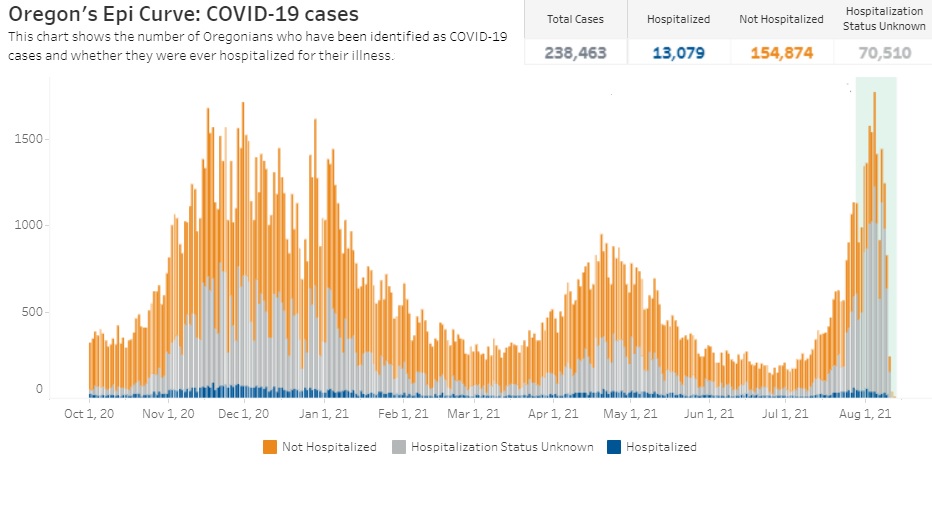
“I know this is not the summer many of us envisioned,†said Governor Brown, “with over 2.5 million Oregonians vaccinated against COVID-19. The harsh, and frustrating reality is that the Delta variant has changed everything. Delta is highly contagious, and we must take action now.â€
While the Delta variant seems to be more contagious, it seems not to be more deadly. According to this graph provided by the Oregon Health Authority, deaths in all age groups have not peaked.
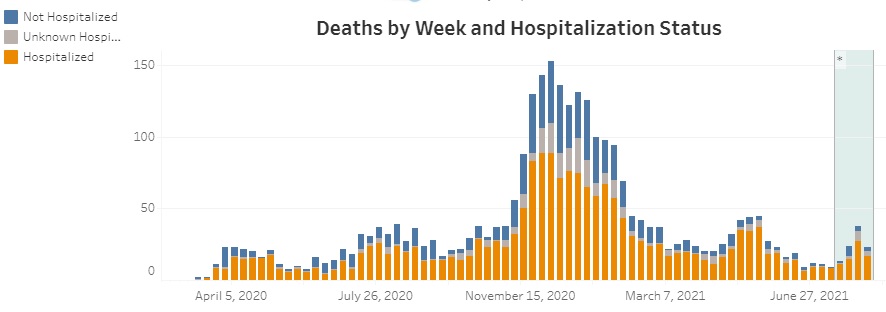
“We will get through this the same way we have before: together. So please, if you have been waiting to get vaccinated, go do it today. Vaccines are safe, effective, and widely available. And, when you go out in public today, wear a mask. Masks are a simple and effective way for all of us to help slow the spread of COVID-19.â€
While the Oregon National Guard also has members with health care, nursing, and medical training, many of those members are already hard at work for their civilian employers –– Oregon hospitals and health care providers.
--Staff Reports| Post Date: 2021-08-15 10:42:33 | Last Update: 2021-08-16 09:25:00 |
Once again, Oregon is internationally famous, and not in a good way
Fox News covered the story -- also reprinted in
the New York Post -- and provided a video clip, saying, "Gov. Kate Brown, the Oregon Democrat,
signed a bill last month with little fanfare that drops the requirement that high school students prove proficiency in reading, writing or math before graduation."
Across the pond, the
UK's Daily Mail extensively reported the bill signing, underscoring the racial component.
"The state of Oregon will no longer require its students to demonstrate proficiency in math, reading and writing in order to earn a high school diploma in a bid to bolster minority students.
"Gov. Kate Brown signed a bill late last month suspending the state's 'essential skills' requirement for graduation for the next three years while its Department of Education seeks alternative graduation requirements.
"The bill extended a suspension of the requirements that was put in place during the coronavirus pandemic.
The
Associated Press chimed in -- again, picking up on the racial aspect -- with this:
Rashelle Chase, founder of Mxm Bloc, an advocacy group led by Black women and focused on education and other social justice issues, said certain children struggle with exams and had been hurt by the testing requirements.
“Under the best of circumstances, in totally normal times with no pandemic, there are a number of children who don’t test well,†Chase said, including children of color, those in need of special education, low-income students and early language learners. She added that it’s “not a deficit on the part of those children.â€
But others say testing is an important tool to assess students’ learning and that eliminating the requirement could be hurtful.
Greg Gutfeld also criticized the Democrat Governor on his Fox News national show.
--Bruce Armstrong| Post Date: 2021-08-15 06:44:59 | Last Update: 2021-08-15 11:52:36 |
Appointed by Governor Kate Brown
Governor Kate Brown has announced that she has appointed Alyssa Chatterjee as the Director of the Early Learning Division (ELD). In this role, Chatterjee will lead the agency responsible for supporting Oregon’s young children and families to learn and thrive. She will oversee the transition of the ELD into the new Department of Early Learning and Care on January 1, 2023.
“I am thrilled to name Alyssa Chatterjee as Director of the Early Learning Division," said Governor Brown. "Alyssa led the development of my office’s early learning and child care policy, and had a key role in shaping policy and supporting the work of my Children’s Cabinet and the Racial Justice Council. She hit the ground running in May as acting director to continue our ongoing work with early learning and child care providers to ensure all children across Oregon can thrive and reach their full potential. I look forward to her continued leadership and collaboration.â€
Chatterjee has focused on early learning policy throughout her time working for the State of Oregon. Prior to joining the Governor’s Office as deputy education policy advisor in August 2019, Chatterjee was among the first employees at ELD when the division was formally created. She served in a variety of roles at ELD, including as a policy advisor and legislative coordinator for the agency. As a member of ELD’s executive team, she helped guide the state’s early learning strategic planning process for the 5-year statewide early learning system plan, Raise Up Oregon. She has a bachelor’s degree from Willamette University.
Chatterjee had been serving as the acting director of ELD since May; her permanent appointment was effective August 1.
--Bruce Armstrong| Post Date: 2021-08-14 19:15:43 | Last Update: 2021-08-14 19:23:57 |
Oregon is one of about half the states that has a robust direct democracy process
Editor's note: This is the second of a multi-part series on direct democracy in Oregon
Oregon is one of about half the states that has a robust direct democracy process. In that sense, we are lucky that we can change our Constitution, make and change laws and even veto acts of the Legislature -- known as a referendum.
The initiative process is described by the
State Initiative and Referendum manual and starts with an idea to create, amend or repeal an Oregon law or provision in the Oregon Constitution. To
file, a chief petitioner needs only have the text of the proposed initiative and between one and three chief petitioners. This form is filed with the Secretary of State and, after a cursory review for any legal problems, the petitioners are issued templates for the sponsorship phase.
Any initiative proposed to change the Oregon Constitution has enhanced requirements:
- It must contain a single subject or closely related subject
- It must include the full text
- It must be legislative rather than administrative in nature
"Templates" refers to electronic forms which, when printed out, become the signature sheets. The "sponsorship phase" refers to the initial period in which the petitioners will gather between 1,000 and 2,000 signatures to get the process started. The reason for this phase is to be able to show that there is sufficient support and energy behind the effort to engage further. During the sponsorship phase, it is required that the text of the measure physically accompany the signature sheets. If there is a small amount of text, the Secretary of State will determine that it can be printed on the back side of the petition. For larger amounts of text, they need to be stapled to each copy.
Once the Secretary of State has validated over 1,000 signatures -- they have 10 business days to complete this -- they turn the text over to the Attorney General who five business days to draft and file ballot title that "impartially summarizes the petition and its major effect." A ballot title is not just a headline. It contains four parts and the wording is vital to the success or failure of each petition.
- A caption that does not exceed 15 words describing the subject of the petition
- A statement that does not exceed 25 words describing the result if the petition is passed
- A statement that does not exceed 25 words describing the result if the petition is rejected
- A summary that does not exceed 125 words describing the major effect of the petition
At this time any registered voter may submit written comments on the legal sufficiency of the draft ballot title. After the
deadline to submit comments, the Secretary of State's Elections Division will forward any comments received to the Attorney General for consideration when certifying the ballot title. Note that these comments should be on the legality of the process, not the content of the initiative. By submitting comments, this gives the commenter standing if the title is appealed to the Oregon Supreme Court -- which it often is.
Out of this process comes the certified ballot title, which will be printed on the back of the signature sheets which will be circulated. Statewide initiatives are only voted on in the general election in even-numbered years but, while an initiative can be filed for any future even-numbered year, chief petitioners are only allowed to circulate for a two-year period prior to the signature turn in date in July of an even-numbered year.
The number of signatures needed is a function of a percent of the vote in the last regular gubernatorial election.
| Constitutional Initiative | (8%) 149,360 |
| Statutory Initiative | (6%) 112,020 |
| Referendum | (4%) 74,680 |
--Staff Reports| Post Date: 2021-08-14 10:27:40 | Last Update: 2021-08-14 10:28:42 |
Facing a great deal of corruption in the political system, Oregon passed many reforms
Editor's note: This is the first of a multi-part series on direct democracy in Oregon
In
The Oregon System by Allen H. Eaton, the author describes the political possibilities in Oregon:
"Of all the democracies in the world, the state of Oregon is the one in which the people can make or unmake at will any law, constitutional or statutory, elect or recall any official, -- in short, do anything in politics which they wish to do, for there is practically no limitation to their political powers."
During the late 19th century, facing a great deal of corruption in the political system, Oregon passed many reforms to its election system. Amazingly, it wasn't until 1891 that Oregon first passed a law requiring a secret ballot and almost equally amazingly, Oregon first passed a law requiring a system of voter registration in 1899.
On the heels of these reforms, in 1902 the Oregon Legislature passed and the people approved -- by a vote of 91% -- amendments to the Oregon Constitution allowing the initiative and referendum process, championed by Populist reformer William U’Ren. The first use of the initiative process was a measure passed in 1904 to create primary elections and end the practice of parties picking nominees through political conventions.
--Staff Reports| Post Date: 2021-08-13 20:34:01 | Last Update: 2021-08-13 17:14:31 |
Who is responsible?
The Oregon Department of Environmental Quality, Southwest Clean Air Agency and Lane Regional Air Protection Agency
issued and extended air quality advisories Friday for many parts of Oregon due to smoke from fires in Oregon, Washington, California and Canada, as well as smog in metro areas.
DEQ expects the air quality advisory to last until a least noon Monday. DEQ and partner agencies will continue to monitor wildfire smoke and ozone pollution, or smog, in these areas.
The following areas are under advisory:
- Willamette Valley: Clackamas, Multnomah, Washington, Lane, Linn and Marion counties due to ozone pollution. Wildfire smoke is also impacting eastern Lane County.
- Central Oregon: Crook, Deschutes and Jefferson counties due to smoke.
- Eastern Oregon: Baker, Grant, Harney, Malheur, Morrow, Umatilla, Union and Wallowa due to smoke.
- Southern Oregon: Curry, Douglas, Josephine, Jackson, Klamath and Lake counties due to smoke. Ozone is also impacting Jackson County.
- Southern Washington: Clark, Cowlitz and Skamania counties due to smoke and ozone.
Smoke and ozone levels can change rapidly depending on weather. Check current conditions on the
Oregon Smoke Information Blog, DEQ’s Air Quality Index, or by downloading the free OregonAIR app on your smartphone.
The Oregon DEQ offers the following advice:
- Stay inside if possible. Keep windows and doors closed.
- Avoid strenuous outdoor activity.
- Use high efficiency particulate air (HEPA) filters in indoor ventilation systems or portable air purifiers. Or create your own air purifying filter by following these instructions.
- Be aware of smoke or ozone in your area and avoid places with the highest levels.
- If you have heart or lung disease or asthma, follow your healthcare provider’s advice.
- Cloth, dust and surgical masks don’t protect from the harmful particles in smoke.
- N95 or P100 respirators approved by NIOSH may offer protection, but they must be properly fitted and worn.
- They won’t work for everyone, especially children.
--Bruce Armstrong| Post Date: 2021-08-13 15:48:02 | Last Update: 2021-08-13 16:02:09 |
Read More Articles







